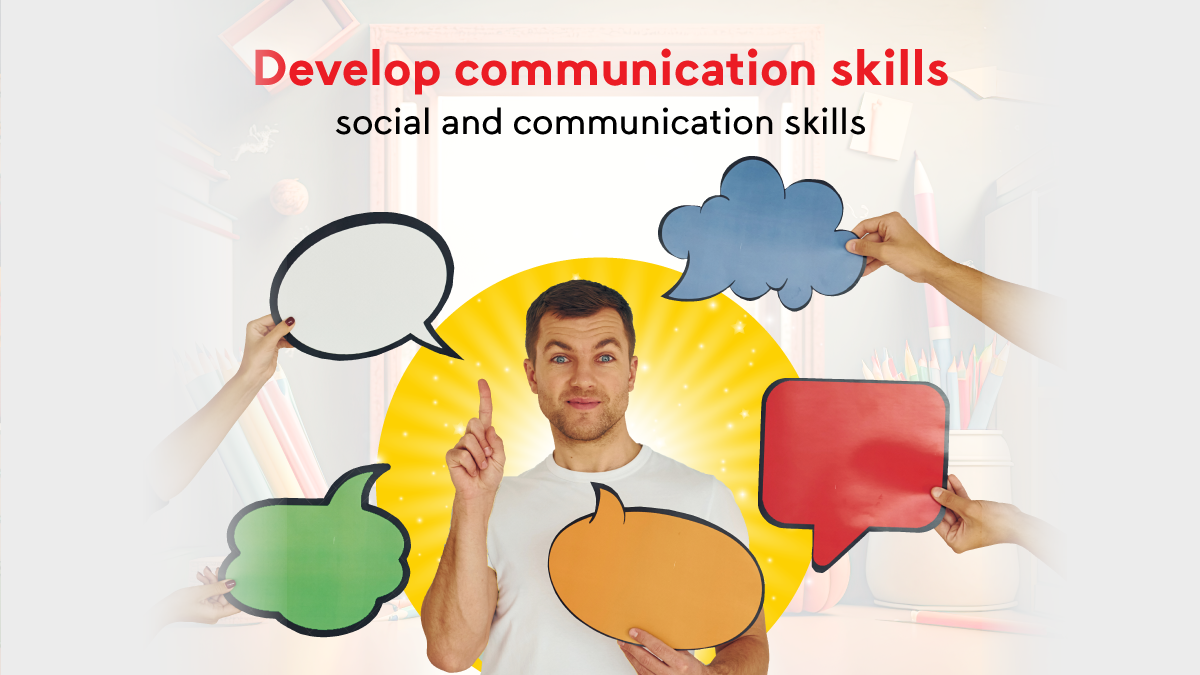
Communication is the cornerstone of human interaction. From the moment we are born we use various forms of communication to express ourselves, connect with others and navigate the complexities of life. To develop communication skills encompassing both social and verbal aspects is crucial for personal and professional growth. In this article, we will delve into the realm of communication skills exploring the significance of social skills and providing valuable insights into enhancing conversational and verbal communication.
The Significance to Develop Communication Skills
Effective communication is the bedrock of successful relationships whether they are personal, professional or social in nature. To develop communication skills empowers individuals to convey their thoughts, feelings and ideas clearly leading to better understanding and reduced misunderstandings. Moreover, honing these skills enhances one’s ability to listen actively, process information accurately and respond thoughtfully.
The Role of Social Skills
In the intricate web of human interactions, social skills serve as the threads that weave connections, understanding, and harmony. These skills encompass a range of behaviors and abilities that allow individuals to navigate social situations, build relationships and communicate effectively. The role of social skills in communication is paramount as they form the foundation upon which meaningful conversations and connections are built.
Empathetic Listening: Understanding Beyond Words
At the heart of effective social interaction lies empathetic listening. This skill involves not only hearing the words spoken by another person but also comprehending their underlying emotions, intentions and perspectives. Empathetic listening requires being fully present in the conversation, setting aside personal biases and genuinely seeking to understand the speaker’s point of view.
When someone feels truly heard and understood a strong connection is established. This connection not only encourages open dialogue but also lays the groundwork for trust and mutual respect. Empathetic listening is particularly crucial in situations where emotions run high or differing viewpoints are at play. It helps bridge gaps, minimize misunderstandings and paves the way for collaborative problem-solving.
Nonverbal Communication: The Unspoken Language
While words convey the explicit content of a message nonverbal cues provide an additional layer of meaning. Facial expressions, gestures, posture and tone of voice collectively contribute to nonverbal communication. Being attuned to these cues enhances our ability to accurately interpret the emotions and intentions of others.
Consider a scenario where someone says I’m fine while avoiding eye contact and slumping their shoulders. The incongruence between their words and nonverbal cues hints at a deeper emotional state. By recognizing these subtleties individuals can respond with sensitivity and offer support creating a safe space for authentic communication.
Respectful Disagreement: Navigating Differences
In a diverse world encounters with differing opinions and perspectives are inevitable. Social skills play a pivotal role in handling such situations with grace and respect. The ability to engage in respectful disagreement involves actively listening to opposing viewpoints acknowledging their validity and expressing one’s own stance without belittling others.
By fostering an environment where diverse opinions are welcomed and valued, individuals contribute to constructive discussions and cultivate a culture of mutual learning. This skill is especially valuable in professional settings where collaborative decision-making hinges on the ability to navigate disagreements while maintaining positive relationships.
Emotional Regulation: Managing Reactions
Emotional regulation is a cornerstone of effective social skills. It entails recognizing and managing one’s own emotions in various situations. When faced with challenging or emotionally charged conversations the ability to remain composed and composed allows individuals to respond thoughtfully rather than react impulsively.
Emotional regulation also extends to understanding the emotions of others and responding empathetically. In situations where a friend expresses frustration or a colleague shares their concerns, responding with empathy rather than dismissiveness fosters a supportive and caring connection.
Adaptability and Flexibility: Navigating Social Dynamics
Social environments are dynamic and multifaceted. Adapting to different social dynamics and contexts requires a combination of skills such as reading the room, understanding social norms and adjusting one’s communication style accordingly. For instance, the way one communicates with close friends might differ from how they communicate with a supervisor or during a formal event.
Adaptability and flexibility in social interactions showcase an individual’s ability to connect with a diverse range of people and navigate various social landscapes. This skill is not only essential for building rapport but also for creating a comfortable atmosphere that encourages open and authentic communication.
So first of you have to learn how to deal with conversational and verbal communication
How to deal with conversational and verbal communication
Communication is the cornerstone of connection woven from words and gestures. This will guide you on how to deal with conversational and verbal communication. Discover strategies to engage, express and connect seamlessly in diverse situations. Whether you’re addressing many or just one, these skills empower confident and impactful interactions….read more about ADHD.
Enhancing Conversational Communication
Conversations from the heart of our daily interactions. Whether we are engaging in casual banter or serious discussions the ability to communicate effectively in conversations is a skill that can be cultivated over time. Here are some strategies to develop communication skills specifically conversational ones:
1. Active Listening
Active listening involves giving your full attention to the speaker and truly absorbing what they are saying. This means refraining from formulating your response while they are speaking and avoiding distractions. Responding with relevant comments or questions that show your engagement with the conversation helps build rapport and encourages further communication.
2. Asking Open-ended Questions
Open-ended questions encourage deeper conversation by requiring more than a simple yes or no answer. They invite the speaker to elaborate and share more information which can lead to richer discussions and a stronger connection. Examples of open-ended questions include What are your thoughts on…? or Could you tell me more about…?
3. Being Mindful of Nonverbal Cues
Nonverbal cues such as facial expressions, body language and tone of voice play a significant role in communication. Being aware of these cues in both yourself and others allows you to gauge emotions, intentions and the overall context of the conversation. Maintaining appropriate eye contact using friendly gestures and moderating your tone can greatly enhance your communication.
4. Empathy and Perspective-taking
Empathy involves understanding and sharing the feelings of another person. In conversations practicing empathy means acknowledging the emotions being expressed and responding in a compassionate manner. Perspective-taking goes a step further by trying to see the situation from the other person’s point of view. This fosters understanding and minimizes conflicts.
Mastering Verbal Communication
Verbal communication is at the core of expressing ideas, opinions and information through spoken words. While some people naturally excel in this area, effective verbal communication is a skill that can be refined with practice and intention. Here are some tips for improving your verbal communication skills:
1. Clarity and Conciseness
When speaking, strive for clarity and conciseness. Organize your thoughts before speaking and express your ideas in a straightforward manner. Avoid using overly complex language that could confuse your audience. Clear communication reduces the chance of misunderstandings and keeps the conversation flowing smoothly.
2. Confidence and Assertiveness
Confidence in your speech shows that you believe in what you’re saying. Speak with a clear and steady voice and maintain good posture. Additionally, being assertive while still respecting the opinions of others helps you express your ideas confidently without coming across as aggressive.
3. Avoiding Interruptions
Interrupting someone while they’re speaking can be perceived as disrespectful and can disrupt the flow of conversation. Practice patience and wait for your turn to speak. This not only shows consideration for others but also allows for more productive and meaningful discussions.
4. Use of Paralinguistic Elements
Paralinguistic elements include aspects of speech beyond the words themselves such as tone pitch and pace. These elements convey emotions and emphasize key points. Using a varied tone and appropriate emphasis can make your speech more engaging and help convey your intended message effectively.
5. Practicing Public Speaking
Public speaking is a valuable extension of verbal communication. It involves addressing larger groups and conveying your message persuasively. While it can be intimidating, practicing public speaking builds your confidence and enhances your ability to communicate effectively in various settings.
Conclusion
To develop communication skills encompassing both social and verbal proficiency is a lifelong journey that pays invaluable dividends. These skills enable us to connect deeply with others, foster positive relationships and thrive in diverse social and professional environments. By actively engaging in practices that enhance our social interaction abilities and refining our verbal communication techniques we empower ourselves to navigate the complexities of human interaction with grace and effectiveness. So whether it’s through a heartfelt conversation with a friend or a persuasive presentation to a large audience honing your communication skills is a pursuit well worth the effort.















